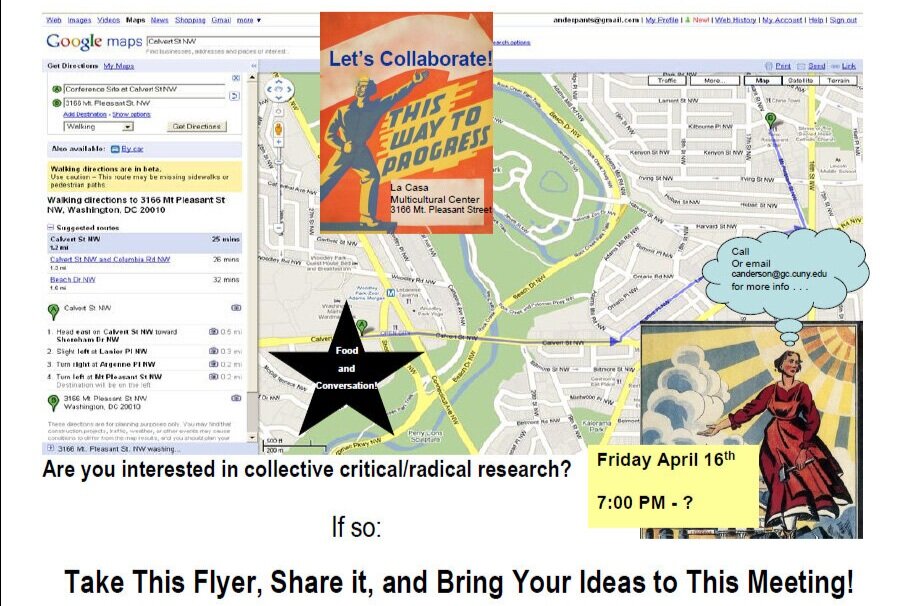[Linking image: Lead story in the Daily Geographer, April 9, 2013]
AAG Subconference
The “subconference” of the American Association of Geographers (AAG) started with the simple idea that the space, time, and critical mass of big annual academic conferences could and should be appropriated as a means for people to meet, commiserate, strategize, think about collaboration, and work in common towards social transformations that might exceed the scope of academic business as usual. Instead of leaving concerns about academic working conditions, the problematic landscapes of higher education, the culpability of universities in larger structural inequities, and the oppressive, alienating, careerist features of academic conferences themselves to discussions separated from the often scripted and performative presentations of theory and practice within official conference events, we wanted start having explicit discussions about the tensions between and among all of these things, and center these as the main order of the day. Seeing the academic labor and the space of the conference itself as continuous with wider terrains of struggle, we began discussions about how we could re-purpose the space of the conference toward these ends—to create mutually supportive moments that might allow us to organize collectively for transformation in and beyond the university.
The first gathering purposefully assembled to explore these ideas was held during the 2010 AAG annual meeting in Washington DC in 2010. Featuring a modest collectively provisioned meal served in a church and community gathering space outside of the conference, it was organized by, among others, a core group of doctoral students from the Graduate Center of the City University of New York, The University of Minnesota, and The University of North Carolina, many of whom were already engaged in collective struggles and collaborative experiments within their own universities and communities. More than 60 people showed up for that relatively impromptu first event. Over the next several years, we continued to use the conference as a space to gather and experiment, variously terming our activities under-conferences (an allusion to Fred Moten and Stefano Harney’s concept of “undercommons”), inner-conferences (conferences within conferences), and eventually “sub-conferences” (with connotations of sub-currents and subversion). We have undertaken a broad range of activities over the years, often as a direct response to needs and concerns identified by participants. We have held themed events in organized sessions, lobbies, and corridors; convened conversations, organized walking tours, and hosted shared meals with activists in community spaces in multiple cities; offered skill-share and professional triage/advising sessions related to socially engaged research, teaching, and early-career survival; spontaneously produced and administered a conference “climate” survey in the interests of better understanding the different needs, concerns, and challenges of conference attendees, in response (see the survey results here) organizing an official dues-collecting Caregiving Affinity Group for the purpose of researching and subsidizing caregiving needs for conference participants; issued a call for a strategic “Journal Jubilee” to better channel academic labor and keep it from being enclosed by privatizing interests; built an international network of affiliated researchers; organized conga-line protests; and more. Some of these activities are archived on various websites (for instance, here and here) and are reflected in the gallery of promotional materials viewable below. While we haven’t organized any big events for a couple conference cycles now, many of the original participants are still around (indeed, some of us now even find ourselves in the surprising and strange position of being tenured faculty!) and committed to the same issues and questions we’ve been grappling with all along. If you want to learn more about any of our past activities, perhaps collaborate on new ones, or otherwise connect about how some of the things we learned over the years might be of use in organizing new subconference-type initiatives, let’s be in touch!
Tampa, 2014
LA, 2013
New York, 2012
Seattle, 2011
Washington DC, 2010









